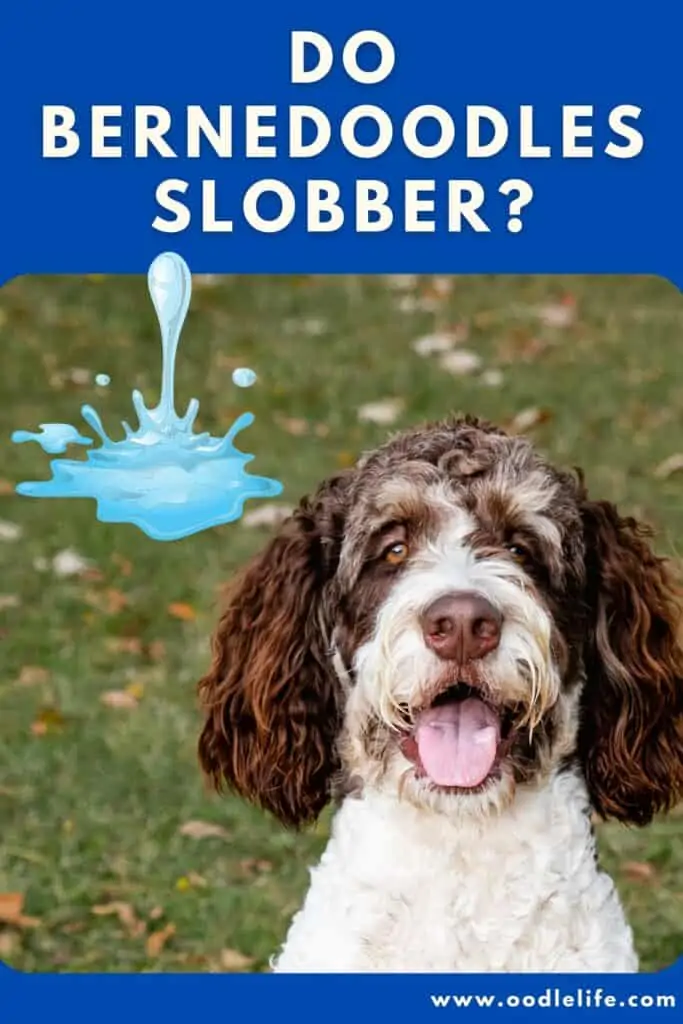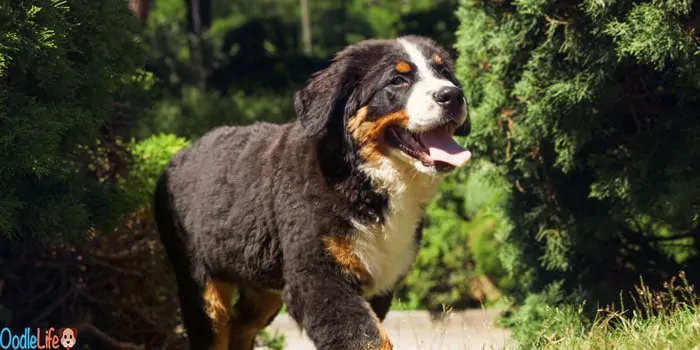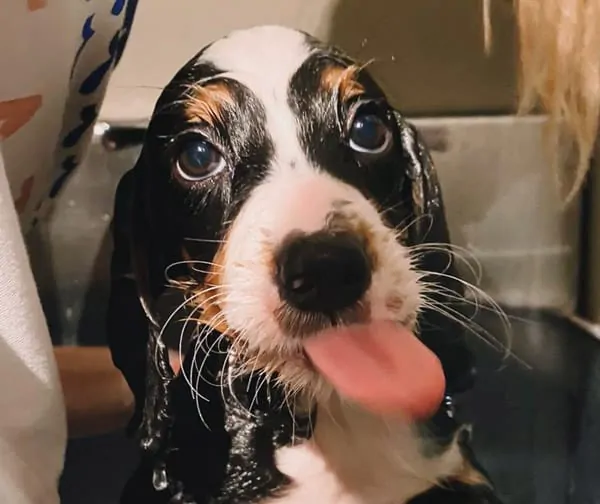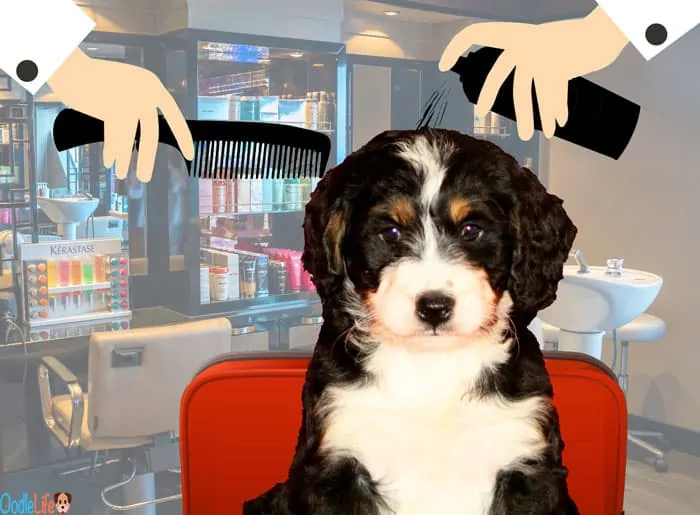Do Bernedoodles Drool? A Slobber Guide
As any dog owner will tell you, drool is an expected part of the package, like house training and daily walks. Some dogs, however, are known to drool more than others.

There are many factors that can influence how much a dog drools, such as their facial and mouth structure, the hair around their mouths, personality, and the environment. Dog breeds with jowly cheeks, loose lips, fleas, and skin folds are prone to excessive drooling.
Do Bernedoodles drool? It’s an interesting question.
Bernedoodles, a cross between a Bernese Mountain Dog and a Poodle parent, inherit opposite ends of the drooling spectrum. With their prominent jowls and penchant for keeping cool, Bernese Mountain Dogs are one of the top big-drooling breeds. Poodles, in contrast, are one of the least likely droolers.
So where does this mixed breed dog end up? Do Bernedoodles owners struggle with drool and excess saliva?
Benedoodles are not known to be heavy droolers. Despite the traits of the Berner parent breed! There will be some natural drooling, of course, and other factors besides their breed can impact how much they drool.
Why Do Dogs Drool?

Dog drool, or ptyalism, is an overflow of the dog’s saliva from their mouth. Dogs have four salivary glands in their mouths that help them produce saliva. There are several reasons why some dogs have a spillover of their saliva and dribble it out of their mouths or have hypersalivation, which is excessive drooling.
It usually comes down the anatomy of the individual dog breed.
Head and Lip Structure
Some dogs’ heads and lips are not able to retain their saliva in their mouth. Dogs, such as the Bernese Mountain Dogs and Saint Bernards, have folds of skin around their mouths which allow for their saliva to accumulate. The slobber dribbles down when they move their heads, which gives them the drooling reputation.
Aids in Digestion
Saliva serves a crucial role in the digestive system.
- It keeps their mouth and throat moist to help the food move through their system.
- The moisture helps break down the food for the body to process.
- Dogs (or people – we salivate too!) salivate when they sense food, whether by sight, smell, or know it is coming. The salivary glands start producing saliva to prepare for their next meal. Dogs drooling can mean they’re anticipating some good food.
Antiseptic
Dog saliva contains a protein that can help their wounds heal faster. When dogs lick their scratches, the saliva both cleans the wound and helps to prevent it from getting infected.
Take precautions that they don’t lick open wounds as there is a risk that bacteria in their saliva can cause an infection.
Get Rid of Unpleasant Tastes
Drooling can also be a way for your dog to get rid of a taste they don’t like. Whether it is food, medicine, or, more likely, something they licked off the floor, they’ll try to eliminate the unpleasant taste by drooling it out.

Anxiety
Just as with people, not every dog reacts to situations the same way. Some dogs have a more tense temperament and can display their anxiety by panting and drooling excessively. Some dogs get motion-sick in the car, which increases their anxiety as well. Your vet can prescribe medicine to help with that.
As per the ASPCA, when dogs drool without food, it can be a sign they are afraid or stressed. Bernedoodles, in particular, are friendly dogs and could get anxious if they are on their own for long periods.
Stomach Issues
Nausea, gastrointestinal distress, and car sickness can cause dogs to drool. It can be a sign they ate something that they shouldn’t have. Many dogs drool on car rides because of motion sickness. Your veterinarian can prescribe nausea treatments if it’s severe.
If the drooling is accompanied by vomiting, shaking, or your dog isn’t acting as usual, speak to your vet to ensure the dog didn’t eat anything poisonous or dangerous.
Mouth Issues
Gum disease, a cracked tooth, oral ulcers, tooth decay, or a burn in the mouth can contribute to canine drooling. If there is a build-up of plaque on their teeth, it can rub against their lips or mouth, causing them to drool. Examine your dog’s teeth and gums for signs of decay or infection. Brush your dog’s teeth regularly to prevent tooth and gum infections.
Also, check if something is stuck in your dog’s mouth or throat. If it’s difficult for your dog to swallow, their saliva will build up in their mouth, and they will drool. Call your vet if you suspect that your dog has something caught in its teeth or throat.

Heat
Drooling more than usual can be a sign that your dog is overheated.
If your dog is panting and drooling, give them water and have them rest and cool down. In hot weather, keep a bowl of fresh cool water available for your dog, avoid too much exercise out in the heat, and never leave your dog in the car on a hot day.
This occurs often with an excited Bernedoodle pup that has not learned to moderate energy use. Given that Bernedoodles love to play in the snow and
If you suspect your dog is suffering from heatstroke, call your vet immediately.
Illness
There are so many reasons a dog may drool, but if your dog suddenly displays an increase or a change in drooling habits and is showing other symptoms of illness such as bad breath and lethargy, it’s best to let it get checked out at the vet. Infections in the sinus, throat or mouth, kidney or liver disease, cancer, and rabies can all trigger drooling.
If your dog licked something toxic, that might also be the cause of the drool. There are some plants that can make your dog sick if they lick or eat them, such as tulips and chrysanthemums.
Normal and healthy saliva is clear or white and should not have a noticeable smell. If your dog’s drool is unusual, get your pet checked out by the vet immediately. Vomiting up excessive saliva, saliva with a nasty odor, blood-tinged or thicker drool than usual are all warning signs that something is wrong.
Taking Care of Drooling Dogs
You will need to keep towels and rags handy to wipe both your dog’s face and probably to clean yourself and the floor. You might also want to invest in one or more of the following items to help contain the drool.
- Seat protectors for the car: You can protect your car’s upholstery with a car seat protector or line the seats with towels.
- Slobber bibs for your dog: Slobber bibs or bandanas will catch much of the dribble from your dog’s mouth. Make them a fashion statement!
- Dog chews: Dog chews help with the canines’ dental hygiene and can prevent dental issues that cause drooling.
- Ginger for car sickness: If your dog’s drooling issue is primarily in the car, it’s possible they have motion sickness. Ginger supplements can help keep the problem under control and even reduce some of their anxiety from getting car sick.
In Conclusion
We’ve hoped this article helped you answer the question, “do Bernedoodles drool?” Bernedoodles don’t have a reputation for being big droolers, but there are many reasons a dog can be excessively salivating.
If you are concerned that your dog is drooling too much or is drooling more than usual, it is always wise to have them checked by the vet. Moderate drooling or increased drooling before eating, when sick, or overheated is normal.